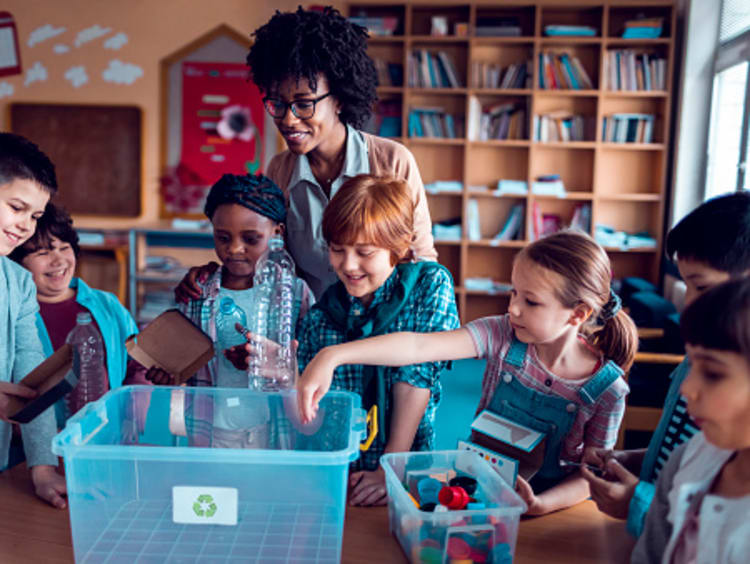Top Ideas for Building a Positive Teacher-Student Relationship

For most students considering online classes, their greatest concern is that they will not enjoy lack of a face-to-face relationship with their instructors. Although this is a legitimate concern, there are clear steps that can help ensure that students feel comfortable in your class which will ultimately lead to their success.
The teacher-student relationship is a key component of learning in any setting, whether online or on campus. After nearly twelve years of experience — and having taught more than 11,000 students — I can recommend some approaches that were proven to be highly effective during my teaching career. Feel free to give them a try and find out which one works best for you.
Build Stronger Teacher-Student Relationships
Some students will excel despite limited — or even zero — interaction with their teachers. Such students are usually self-motivated, highly focused and driven by their own plans to succeed. However, most students experience anxiety, questions and self-doubt. This is where we teachers step in to help alleviate their concerns and create a positive learning environment where they can thrive.
How can we do this? There are several approaches, and these can be combined to help ensure that each student feels a positive connection. The first approach is to project a consistent, positive attitude. A friendly approach goes a long way in making students feel comfortable, and when a student is comfortable, they can focus on their course work. One practical recommendation is to post messages at the very beginning of the course to let students know the resources needed for their success are available, and they are encouraged to contact you with any questions or concerns.
Word choice is also important. For example, ending a post with “I know you can do this” or “Great job on this, keep it up” goes a long way toward developing a positive relationship with a student. When the class sees this consistently, they buy into the fact that their instructor is sincere and wants them to do well. Many students will comment that this sort of positive word choice did not occur in previous college courses, and that it is refreshing to know their instructor has such a positive attitude. It really does make a difference in how students view their instructor and, ultimately, in their overall performance in the course. Student success increases when they feel comfortable and confident with their instructor.
Building Positive Relationships With Students — A Teaching Practice
We understand that students are generally more motivated at the beginning of a course. This is particularly true in early classes in their program. One great way to build a positive relationship is to use this energy to your advantage. Motivated students are more likely to read instructor posts or watch videos shared by their instructor. This initial phase is a great opportunity to get your messaging across. You can showcase your personality early on to help make students feel comfortable.
Most likely you have had an experience with an instructor, whether online or in a traditional classroom, who appeared to be devoid of any personality. It seemed like they were there solely for a paycheck and were not engaged. Many students have had previous experiences at other schools in which they had virtually no interaction with their instructors. This is consistently mentioned by students that are surprised to see the level of engagement I provide in their class. Do not be afraid to put yourself out there. Students want to feel a connection and know that their instructor is a real person who cares about their success. Strike while the iron is hot, and the results will be there.
The Power of Videos for Student Success
Although there are plenty of other solid approaches, the most valuable in my experience is the use of videos in the classroom. Students respond very positively to instructor-created content. This includes developing weekly video announcements to touch base and let students know what will be discussed that week, assignment videos that clearly show how to successfully complete their work, and, most valuable, the welcome to class videos in end-of-course surveys.
Students overwhelmingly report in end-of-course surveys the value of these videos. While it may mean stepping outside your comfort zone, making short videos will absolutely accomplish several goals, including putting students at ease, showing your personality, giving students a face to go with the name, and demonstrating that you are there to help each of them be successful.
Videos humanize you in the eyes of your students and make it clear that you are approachable and want to help. In the four years of creating video content for my students, the number of total views is in the tens of thousands, so the results are clear. Students love the videos and the sense of connection that go with them. Videos are incredibly easy to create, and you do not need to be a tech wizard to create professional-level content.
One of the biggest obstacles for instructors is their fear of appearing on camera, but students are not expecting a perfect video with flawless delivery. They genuinely appreciate the effort, as shown by strong end-of-course survey results and student comments about instructors who have dared to make the leap — more of a hop really — to video. If you are nervous about creating that first video, reach out to a colleague who has created video content, and use their examples of what to do (or what not to do). Building positive relationships with students is worth stepping outside your comfort zone.
It can be challenging to develop rapport with students in any setting — and especially in the asynchronous online format. However, if an instructor is willing to employ the approaches I have offered above, they will see significant benefits. Students will appreciate the effort, feel more comfortable and confident, and as a result, they will likely be more successful within your course. By being able to answer the question "Am I approachable?" with a resounding “Yes!” you will be helping improve the odds that your students will do well and continue to progress in their educational journey.
Learn more about GCU's College of Education and the available degree programs that help educators deliver enriching instruction across a variety of academic settings.
Approved by Online Full-Time Faculty for the College of Education on Oct. 24, 2022.
The views and opinions expressed in this article are those of the author’s and do not necessarily reflect the official policy or position of Grand Canyon University. Any sources cited were accurate as of the publish date.


